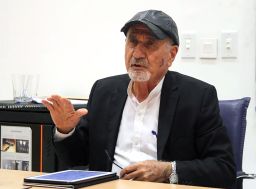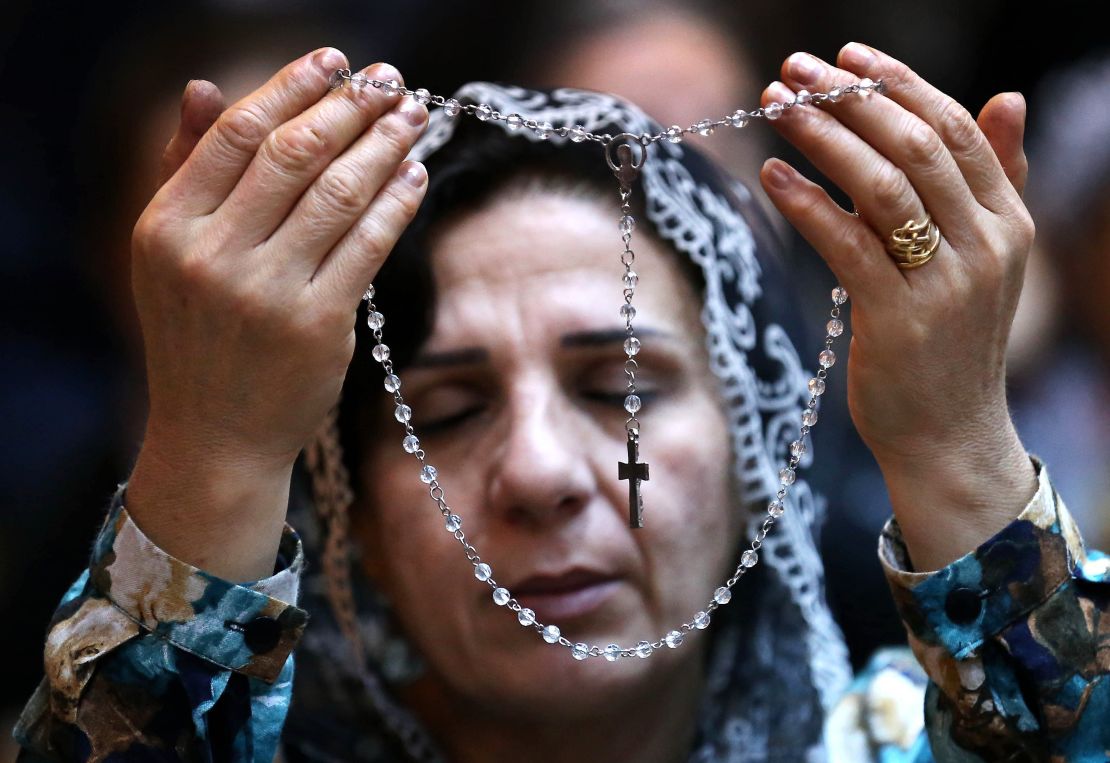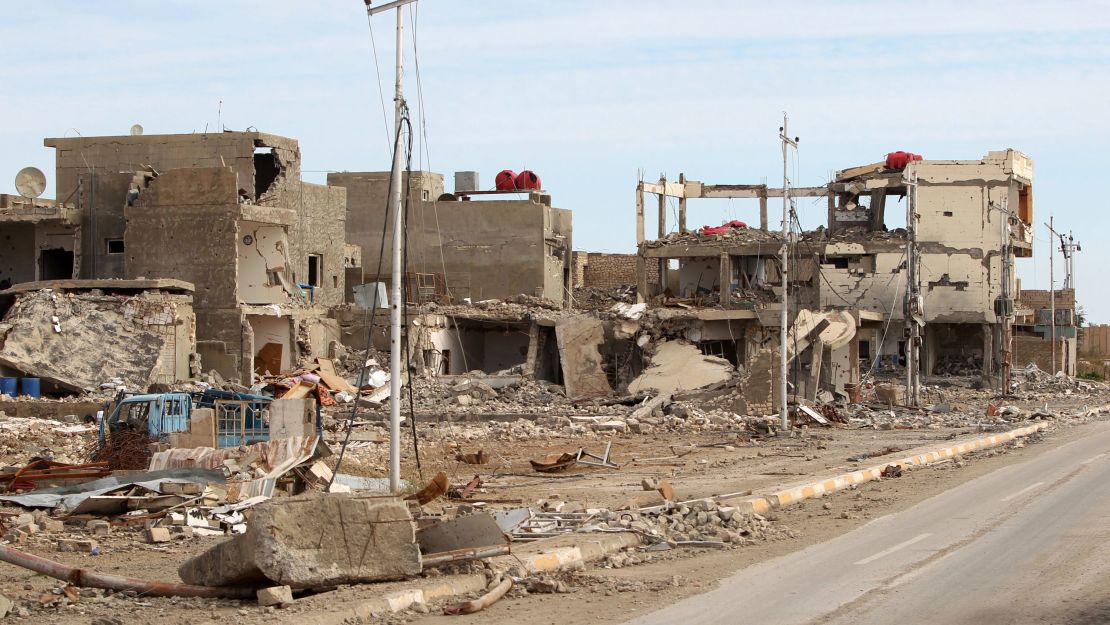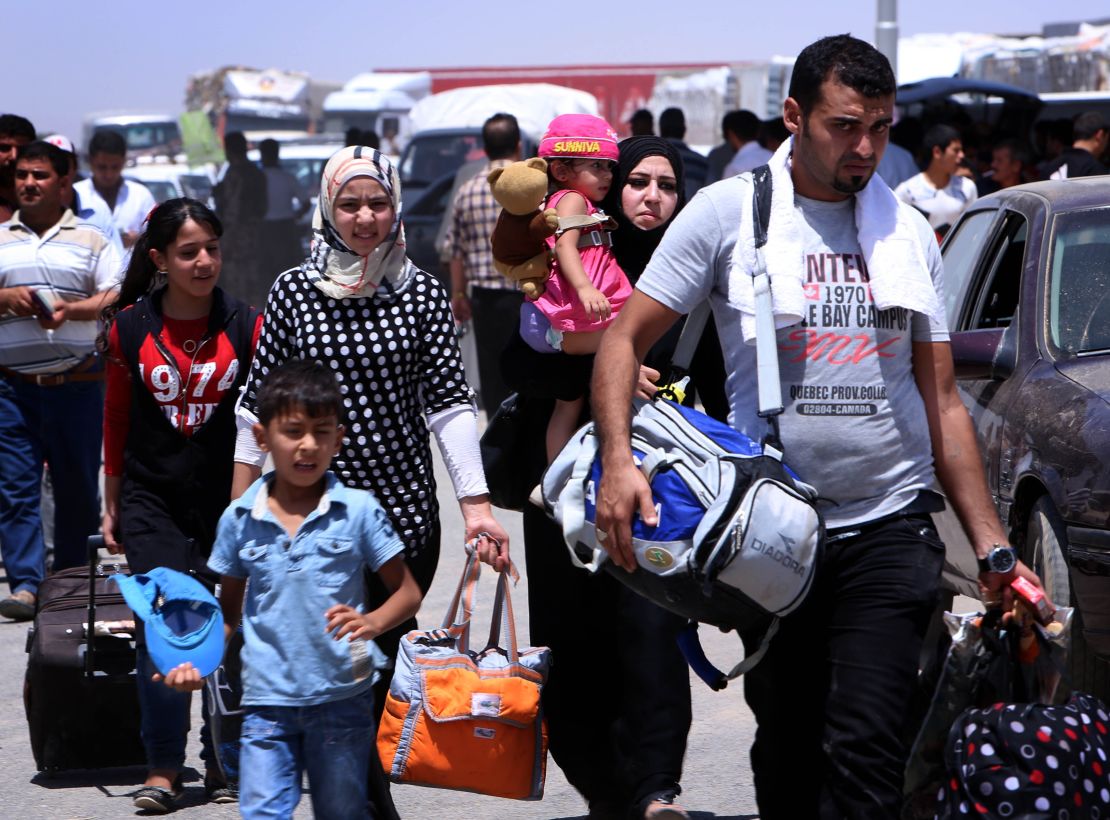Story highlights
Iraqi forces are preparing to retake Mosul, which fell to ISIS in 2014
Mosul used to be a diverse microcosm of Iraq, a city of diversity
A key question is how the Iraqi government will handle a post-ISIS Mosul
Mosul over the decades
(CNN) – In his studio apartment in Chicago, Mahmoud Saeed is surrounded by a city gripped by gun violence. But it is the violence tied to his hometown in Iraq that saturates his soul with sadness.
He remembers a time in the northern city of Mosul when Arabs, Kurds, Jews, Christians, Yazidis, Turkmen and Armenians existed harmoniously with one another.
Hard to imagine now, Saeed says. “People just want to kill each other.”

Saeed, a celebrated Iraqi author of 30 novels and short stories, monitors the news of an imminent and decisive battle to drive ISIS from Mosul, the militant group’s last bastion of power in Iraq. An unlikely alliance of troops is converging on the rugged plains of Nineveh, and the first salvos could come as early as next week.
I telephone Saeed to get his perspective on the so-called mother of all battles to liberate Iraq’s second-largest city. We talk about how evil inherent in the human spirit motivated his writing, and how ISIS epitomizes that evil. For his independent ideas and frank opinions, Iraqi authorities jailed Saeed six times, tortured him and banned his work. He tells me he had no option but to leave his homeland in 1985.
Now 77 and frail, Saeed views the upcoming offensive as perhaps the last opportunity in his lifetime to build a path to peace in Mosul and, subsequently, Iraq. What happens in post-ISIS Mosul could act as harbinger for the rest of the fractured nation.
After years of dictatorship, occupation, sectarian strife and government mismanagement in Iraq, Saeed’s perspective on the future is laced with a heavy dose of skepticism. I can hardly blame him.
Power in the name of religion has destroyed Iraq, he says, and ISIS is the latest manifestation of a long line of injuries to the nation.
The importance of the looming military operation has been highlighted in the halls of power from Washington to Baghdad, but Saeed is concerned that few discussions are centered on the plight of his fellow Moslawis.
First, there is danger of a catastrophic civilian exodus in the midst of raging battle, as was the case last spring in the fight for Falluja.
The United Nations estimates as many as 1.2 million people could be affected in the Mosul campaign. Already, 3.3 million Iraqis are displaced from their homes, and aid workers fear they do not have the resources to absorb many more.
Bruno Geddo, the UN refugee agency’s Iraq representative, says Mosul could trigger “one of the largest man-made displacement crises of recent times.”
A second worry is the one that consumes Saeed: How will Mosul and the rest of Nineveh province ever be able to rebuild and reconcile the deep scars of sectarian atrocities?
Those scars predate ISIS; the minority Sunnis were favored under Saddam Hussein. The tables turned with the 2003 invasion, and in recent years the Shiite-dominated government in Baghdad has marginalized Sunnis and failed to guarantee representation for all Iraqi communities, according to a report by the US Commission on Religious Freedom.
Now there are fresh wounds that have to be healed, but few seem to be addressing the harsh political realities of a post-ISIS Iraq. Many players from the various ethnic and religious factions within Iraq are united in their opposition to ISIS, but they could try to vie for power in the aftermath.
Saeed tells me stories about his youth in Mosul, known as the city of two springs because the weather is just as pleasant in the fall as it is in the spring. Often he tended to his family shop in a centuries-old souk when his father went for afternoon prayers.
He remembers his father’s Jewish friends.
“They all spoke Arabic and we were one family,” he says. “Mosul was a peaceful city. I want this blackness to be over.”

Terror and genocide
Though minority populations have been diminishing in Iraq for years, Mosul was still an ethnic and religious microcosm of the country until it fell to ISIS.
On July 4, 2014, ISIS leader Abu Bakr al-Baghdadi led Friday prayers in Mosul’s 12th-century Great Mosque of al-Nuri. Shrouded in a black turban and robes, the militant cleric declared the founding of a new caliphate and called on fellow Sunnis to carry out a holy war.
The arc of the letter ‘n’ in Arabic began appearing on Christian homes, for the derogatory term Nazarene, along with these words: “Property of the Islamic State.” ISIS terrorized Christians and other minority groups with an ultimatum: convert or leave. Otherwise, face the sword.
The forced conversion campaign decimated entire communities and emptied Nineveh province of Christians, Yazidis, Shabaks and Shiite Turkmen as they fled ancestral homes to survive.
It has been nothing short of genocide, says San Diego businessman Mark Arabo, a Chaldean Christian whose family hails from a village on the Nineveh Plains that was overrun by ISIS. Arabo founded the Minority Humanitarian Foundation, which says 40,000 Christians have fled the area since ISIS seized control.
“This is the most troubling humanitarian crisis since World War II,” he says. “It’s the annihilation of human beings, and the problem is more deeply rooted than liberating a city.”
Ode to Mosul
like seeds in the air
on banks of Tigris
that flows in Mosul
Go out and see
How Mosul is free
Despite the shackles
Go out and see
How the birds are singing
On roofs of jails
On the fence like angels
When they turn to life, in
March,in the silent jungle…
Arabo says his heart is broken over the tragedy in Nineveh. Even if Mosul is liberated, he says, Christianity is dead in its birthplace, and the Yazidis face extinction.
Those who stayed in Mosul have been trapped there and divorced from the outside world, living under a brutally imposed Wahabi ideology. ISIS is equally ruthless with Muslims, both Shiite and Sunni.
Accounts from residents paint a bleak picture of morality enforcers who arrest and punish anyone who violates Sharia or Islamic law. Clandestine reports on blogs and social media describe grisly executions and public floggings. ISIS banned music, the Internet and mobile phones.
There’s a shortage of electricity, medicine, food and other essential services and goods. Residents don’t have enough money to live decently, and conditions have worsened as Iraqi forces have been advancing toward Mosul and retaking territory on the city’s outskirts.
Saeed worries for the safety of his sisters, still in Mosul. But he dares not call.
“I don’t know what happened to them after ISIS,” he says. “I am afraid. Everything is censored. If they discover a phone call from America, who knows what will happen to them.”
Daesh must be defeated, he says, referring to ISIS by its Arabic acronym. But he cannot stand the thought of more death, more destruction. What will become of his family? What will remain of Mosul?
Again, Saeed casts his mind back to the days he cherishes. Mosul’s central library, overlooking the Tigris River, once boasted a rich collection of books and manuscripts, and it was there that Saeed first read Tolstoy, Dostoyevsky, Dickens and all the storytellers who inspired him to write.
“Our library in Mosul was different,” he tells me. “You cannot imagine how many books were there.”
Saeed learned last year that ISIS ransacked the library, torching 100,000 books and manuscripts. Videos showed militant fighters rampaging through Mosul’s museum with pickaxes and sledgehammers. They dynamited ancient Christian and Muslim shrines and archaeological wonders like the gates of Nineveh.
Even on the phone, I can sense Saeed’s sorrow and his longing for the way of life he knew in Mosul. Some things are gone forever, he says, but people can again live side by side.
He wants desperately to believe his own words.
But like other Iraqis worn down by constant bloodshed, Saeed keeps his optimism in check, and as we converse he brings up all the thorns that could mar a peaceful outcome.
Iraq’s Baby Noor: An unfinished miracle

The lessons of Anbar
Last week, Iraqi Prime Minister Haider al-Abadi took to the airwaves and addressed the nation about the upcoming operation against ISIS.
“Today we are advancing and winning together and working to bring life and services and stability to every city and village. We will work together to spread peace, love and forgiveness between everyone, and there won’t be a place for these criminals among you,” he said.
The vision is idyllic; the task at hand is daunting.
In military circles, the Mosul offensive draws comparisons to two other cities where Iraqi forces wrested control from ISIS: Ramadi and Falluja.
Today, they are but blocks and blocks of apocalyptic destruction.
Aerial drone footage released by the International Committee of the Red Cross shows Ramadi’s staggering losses. Entire rows of houses razed, the streets empty. A UN satellite image analysis found 5,700 buildings had been damaged since 2014; 2,000 were destroyed.
The electricity grid was heavily damaged, as were the main hospital, train station and 64 bridges. The once-prosperous capital of Anbar province was reduced to a ghost town after Iraqi forces drove out ISIS last December.
Almost a year later, Ramadi remains uninhabitable, and people have not been able to return home. The cash-strapped Iraqi government has to rely on foreign donors for reconstruction money.
If there is a protracted fight in Mosul, the toll could be equally high. Renad Mansour, an expert on Iraq at the think tank Chatham House, says ISIS will not give up its crown jewel without a fight.
The militants could try to draw the fighting into the heart of the city to maximize civilian casualties and property destruction.
“This is an existential battle for ISIS,” Mansour says. “They are ready for this. They have been preparing for it ever since they took it over.”
Soon, some 4,000 Iraqi soldiers are expected to begin their assault from the outskirts of Mosul, where two years ago they suffered a humiliating loss to ISIS. They will get help from the US military and the Kurdish Peshmerga.
Many others are eager to join the fight, among them the Hashd al Shabi, the Popular Mobilization Units comprising about 40 different Shiite militias, who once fought the Americans but are now recognized by Baghdad as a legitimate military force. The PMUs have been involved in the war against ISIS and helped drive the militants out of Falluja in June.
Al-Abadi has said the militias will not be a part of the Mosul offensive, but the city’s mostly Sunni residents fear otherwise. They see the participation of the militias as a regression to the days of former Prime Minister Nuri al-Maliki, when Shiite soldiers and police controlled Mosul with tyranny.
“That fear doesn’t come out of a vacuum,” says Bilal Wahab, a fellow at the Washington Institute for Near East Policy. “You have other Sunni cities being liberated from ISIS and then Shiite militias acting irresponsibly. That creates backlash.”
Reports of widespread abuses by the militias as well as government forces surfaced during the battle for Falluja, a Sunni city, in May and June.
Wahab says it’s critical that Moslawis are safeguarded from mistreatment. It’s also critical for them to see Sunnis among their liberators and, later, among the local police force.
“There were lessons learned in Falluja and Anbar,” Wahab says. “Sunni tribes have to be incorporated into this effort. The question is, are they going to be symbolic or will they have a significant role?”
A much-heralded military victory has to go way beyond ripping down the black flag of ISIS from the gates of the governate, Wahab says.
“We have heard a lot about sectarianism in Iraq, but we don’t hear about the economy,” he says. “What’s necessary is focusing on the aftermath – jobs for young people, reconstruction of infrastructure. We need to take away incentives for youths to join one armed group or another. That’s what victory looks like.”
That conversation may be happening in the ivory towers of America, but not in Iraq.
“The Iraqi political psyche is such that it takes everything sequentially,” Wahab says. “The attitude is: ‘Let’s deal with ISIS first. We’ll worry about reconstruction when we come to it. We’ll worry about jobs when we come to it.’ That’s worrisome.”
Also worrisome is the exclusion of Moslawis in the debate about the future, says Rasha al-Aqeedi, a fellow at Al Mesbar Studies and Research Center in Dubai, who fled her native Mosul in 2013 after receiving a death threat.
Mosul, she says, has its own distinct character and culture, and to govern it one must first really know it. But that requisite for governance seems to have been lost in Iraq.
A few weeks ago, al-Aqeedi was in the Kurdish capital of Irbil and managed to make a call to a cousin still in Mosul. Her cousin was optimistic about the future. So is al-Aqeedi.
Sometimes.
She says she harbors doubts about whether Iraq will be able to control “the sectarian madness.”
“Most of all, I fear that other Iraqis and some select group of non-Iraqis who may have a hand in trying to control Mosul in 2017 may not understand what makes the place tick,” she writes in a recent essay. “The details matter, but, alas, details are often ignored.”
The long, sad story of Falluja

‘Through the Eyes of Angels’
At the height of the Sunni-Shiite sectarian war in 2006, Saeed, the Iraqi author, traveled from his home in Chicago to visit a friend in Tijuana, Mexico. He was so disturbed by the US-led invasion and subsequent bloodletting that his mind had “gone into hibernation.”
But Tijuana energized him. He took in the boisterous public life, music in the squares, the aromatic street food and people staying up late at night talking, dancing, laughing. Those things reminded Saeed of the Mosul he once knew.
He saw a boy, maybe 5, running barefoot, carrying a bag of onions or tomatoes or something else. Saeed followed him and watched as the boy ran into a house and then emerged with a small apple as payment for his labor. He plopped down on the doorstep to relish his hard-won fruit.
When Saeed was a child, he, too, ran through the streets, barefoot, to tend his father’s shop. He saw himself in the Mexican boy and, feeling inspired, sought out an Internet café and began writing his next book: “The World Through the Eyes of Angels.” It is set in Mosul.
Saeed tells me the Tijuana story – which appears in the preface of his book – toward the end of our long conversation. “Who would let their child run like that through Mosul these days?” he asks. “You cannot even go one block safely.”
In Chicago, Saeed leads the lonely life of a refugee, far from his family and homeland. The years have not been kind to him. He suffers from high blood pressure. And a broken heart.
He refrains from regret; that would kill him, he says. I ask how he manages in his tiny apartment, and he tells me he’s filled it with a thousand books.
And all his memories of Mosul.





























